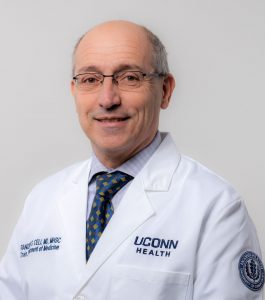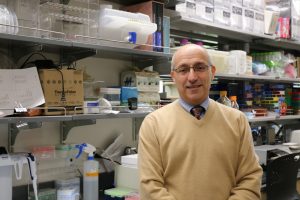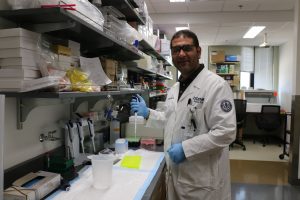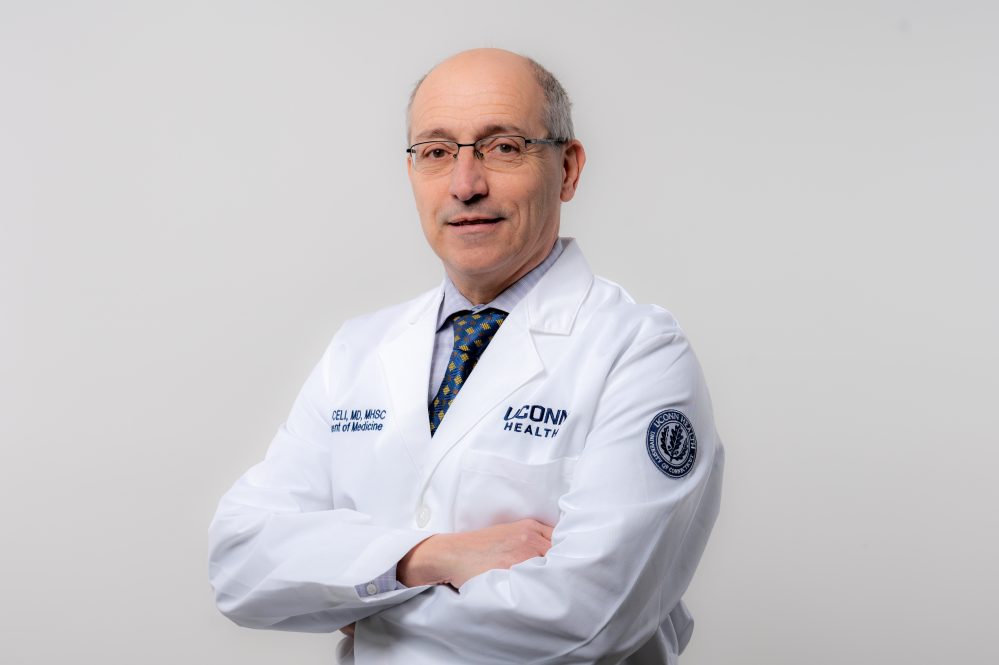Meet Dr. Francesco Celi. This year he joined UConn Health from Virginia Commonwealth University (VCU) where he was Chair of the Division of Endocrinology, Diabetes and Metabolism and directed its Health Diabetes Program. He is a past Clinical Investigator at the National Institute of Diabetes, Digestive, and Kidney Diseases. In addition to leading the Department of Medicine, Celi maintains a part-time endocrinology practice at UConn Health treating patients with thyroid diseases and diabetes. But the majority of his time is spent gaining scientific insights to enhance the clinical care experience and outcomes of patients conducting exciting clinical and translational research.
UConn Today sat down with Celi for this informative Q & A to learn a lot more.

Q. Why did you choose UConn?
A. There are so many great reasons why I joined UConn Health. It was also for personal career growth too to be the Chair of the Department of Medicine. Working in endocrinology as both a physician and a scientist is my passion. I love working in an academic medical center with integrated missions of excellence in patient care, research, and medical education. I know that this integration truly leads to great successes for medicine, science, and most importantly for fully understanding and meeting the health care needs of our patients.
Q. How have your first few months on-the-ground been at UConn Health?
A. It’s an exciting time. I have both my laboratory research and clinical endocrinology care operations now underway at UConn Health. I started seeing patients April 1 and it’s been great! My clinical focus is thyroid disease and diabetes care. My clinical research is studying energy metabolism and personalized medicine in patients living with hypothyroidism. I have always had a keen research interest in obesity and insulin resistance.
Q. What do you hope to do most for Connecticut’s patient population?
A. My major clinical focus is optimizing diabetes care. In my past institution during COVID-19, we were able to elevate the care of patients living with diabetes. These patients are high-risk for health complications including those from COVID-19. For example, during the pandemic we were able to better manage high-risk hospitalized patients with diabetes in a very effective and efficient way using continuous glucose monitoring technology, even minimizing their interactions with health care providers and without the need of sticking the patient every hour to test their glucose level or to adjust their insulin pump. We plan to apply our lessons learned in day-to-day operations here at UConn Health. We have also already begun collaborating with our surgical colleagues on how to best enhance care and the patient experience for diabetes patients before, during, and after surgery.
Q. Do patients with diabetes experience elevated health care disparities?
A. Immensely! For patients living with diabetes their social determinants of health are a major concern. I look forward to helping this Connecticut population. For example, changes in insurance often effect a patient’s insulin formulation and the associated medication costs. Our providers and nurses at VCU were proactively calling patients to see if they needed any help navigating their insurance, medication needs and their costs to ensure the patient’s diabetes remains on target. It’s all about delivering the best care possible to the patient. I hope we will be able to bring this model of care to UConn Health.

Q. As an endocrinologist helping patients with diabetes in managing their weight, what do you think of the growing popularity of diabetes drugs such as Ozempic being used off-label for weight loss?
A. Obesity is a real health condition. Obesity can be lethal and needs intervention. I am not opposed to medical treatment for obesity. We need to remove the profound stigma around obesity, and it needs to be treated. Diabetes drugs associated with weight loss such as Ozempic have become very popular. They work by slowing down the emptying of the stomach making the patient’s insulin more effective in disposing carbohydrates in the body. It suppresses one’s appetite by making people feel fuller. But patient access to these injectable diabetes drugs prescribed by doctors off-label also comes down to insurance coverage and affordability issues. These drugs seem to be effective for low-risk patients seeking weight loss. However, resorting to pharmaceutical treatments will never negate the first line of obesity treatment which is daily lifestyle modification and physical activity. These drugs are absolutely not a replacement for healthy habits.
Q. In your opinion what is leading to the obesity epidemic?
A. We need to be empathetic. Obesity can be linked to physical, psychological, or social determinants of health. As humans we weren’t engineered to always have breakfast, lunch, and dinner daily. For 100,000 years our bodies were trained to retain more food energy than we need to survive just in case food the next day was scarce. Also, when it comes to one’s social determinants of health, food rich in calories and carbohydrates are the cheapest while the healthiest food is more expensive. It’s hard to have a balanced diet on a budget. This is especially true in neighborhoods lacking grocery store access that essentially are food deserts.
Q. Are thyroid diseases becoming more common?
A. Thyroid diseases are very common conditions. But I believe prevalence may not be increasing, just rising diagnosis and treatment due to enhanced awareness. Paradoxically we are finding that often less care may be better. Thyroid disease impacts disproportionally women who are of reproductive age. Later in life, there is a greater increase in women experiencing hypothyroidism, known as an underactive thyroid.
Thyroid nodules are a very common condition. At minimum, 60 percent of us have some kind of thyroid nodule. Also, thyroid cancer is common too. When it comes to nodules, the question is whether to biopsy them or not. But we try, and need to be, as least invasive with thyroid disease care that we can. For example, most forms of thyroid cancer have a very slow progression and tend to be less invasive cancers that are not life threatening. Thus, very seldom is it necessary to take radical steps, and a conservative treatment (often limited surgery) and attentive surveillance are sufficient.
There are two very eye-opening stories to put this in perspective. South Korea implemented a de facto universal screening for thyroid cancer in the early 2000s. This resulted in a mass thyroid cancer epidemic in that country. But cancer death rates remained low even with increased prevalence indicating that many of the cancer detected had very little if any biological relevance. Also, in the U.S. thyroid cancer care is one of the leading causes of medical bankruptcy. As doctors we need to make sure we are not doing more harm than good and take our time when making decisions for more aggressive treatments. We don’t want to overtreat patients and we should aim to limit their surgical experiences.

Q. Why is more research on thyroid disease important?
A. When it comes to thyroid disease symptoms it is important to understand what is related to thyroid disease and what is not. We as doctors need to be transparent if we don’t know. The association between thyroid stimulating hormone (TSH) level and symptoms is not always clear and it is not clear whether medication adjustments can help ameliorate symptoms. This is why I want to do more research! For example, while hyperthyroidism, when there is too much TSH, is clearly associated with weight loss, the association between hypothyroidism and weight gain is less clear. We observed that thyroidectomy is associated with weight gain but only on average 4 lbs. What is very interesting is the thyroid disease affects patients in a unique way, and it is incumbent on us discovering which individual would benefit from certain treatments. In previous studies we identified a common polymorphism in a gene that encodes for an enzyme that regulates the metabolism of the thyroid hormones which is associated with weight gain and diabetes risk.
Q. What are you most excited for on the horizon at UConn Health?
A. We will be building a metabolic chamber to measure a patient’s individual energy expenditures and preferred fuel – such as carbs, fats, amino acids – consumption. The UConn Health scientific community will be able to use the chamber to assess their patient’s individual care needs. The results obtained from the metabolic chamber will allow for very personalized medicine for metabolic diseases such as diabetes and thyroid diseases such as hypothyroidism. The chamber will be able to measure a patient’s oxygen intake, carbon dioxide exhale, and how much body energy is burned. It will even allow for advanced exercise tolerance testing too.
Plus, I am excited to report that we are launching a new initiative called The Rising Scholars Program, a two-year mentored program at UConn School of Medicine, with the goal of training and retaining the next generation of physician-scientists right here at UConn. We want to extend the recruitment nationally to talented medical residents and clinical fellows including, in particular, those in our internal medicine residency and fellowship programs. Those accepted into the program would work most of their time in the research setting to gain greater experience while working part-time in primary care to help give back to the community while easing the primary care physician shortage too. Our first two Rising Scholars were approved starting this July. Applicants can apply online.
Q. You treat so many types of endocrinology patients, do you have any other talents to share?
A. I started and was in the orchestra at Virginia Commonwealth University. I can’t wait to start looking for musicians in our community and hopefully starting an orchestra here at UConn too. I play the violin, this was a midlife crisis, definitely cheaper than a Ferrari! How about you UConn? Send me an email! I can’t wait to organize one. An orchestra is another way to give back to our community while also reducing health professionals stress levels and burnout. Music is indeed medicine.
Celi earned his medical degree and trained in his native country of Italy at Sapienza – University of Rome, one of the oldest universities in history, specializing in geriatrics. Plus, he completed his Internal Medicine Residency Program at the Greater Baltimore Medical Center in Maryland, and completed clinical fellowship in Endocrinology, Diabetes and Metabolism at the University of Maryland. While at the NIH he received his Health Sciences master’s degree from Duke University.



